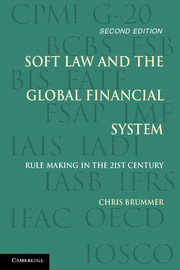Book contents
- Frontmatter
- Contents
- Preface to the New Edition
- Acknowledgments
- Key Abbreviations
- Introduction: The Perils of Global Finance
- 1 Territoriality and Financial Statecraft
- 2 The Architecture of International Financial Law
- 3 A Compliance-Based Theory of International Financial Law
- 4 How Legitimate is International Financial Law?
- 5 Soft Law and the Global Financial Crisis
- 6 Implementing the G-20 Agenda: A Transatlantic Case Survey
- 7 The Future of International Financial Law
- Index
5 - Soft Law and the Global Financial Crisis
Published online by Cambridge University Press: 05 November 2015
- Frontmatter
- Contents
- Preface to the New Edition
- Acknowledgments
- Key Abbreviations
- Introduction: The Perils of Global Finance
- 1 Territoriality and Financial Statecraft
- 2 The Architecture of International Financial Law
- 3 A Compliance-Based Theory of International Financial Law
- 4 How Legitimate is International Financial Law?
- 5 Soft Law and the Global Financial Crisis
- 6 Implementing the G-20 Agenda: A Transatlantic Case Survey
- 7 The Future of International Financial Law
- Index
Summary
We turn now from theory to address what is (quite literally) the trillion dollar question: what role did international financial law play in the financial crisis? Given the prominence of regulatory failures in the United States, many commentators answer, “very little.” After all, the financial crisis occurred in America's backyard, helped along by weak regulatory oversight by local officials. US financial authorities suppressed interest rates and, in the process, encouraged speculative real estate lending practices for subprime borrowers. Loans were pooled, sliced, and sold off to undercapitalized banks and financial institutions that relied on unregulated derivatives transactions like credit default swaps to hedge their risk. Credit-rating agencies, mired in significant conflicts of interest, barely scrutinized the underlying real estate risk posed by these complex derivatives. And in the absence of regulations concerning executive compensation, Wall Street bankers had perverse incentives to take outsized risks to maximize their pay. Bankers’ short-term goal of earning high annual salaries outstripped any concern for the long-term stability of the institutions for which they worked, and exacerbated the impending financial crisis.
Even so, US rules and regulations were not solely responsible for the failure to anticipate or mitigate the financial crisis. Despite the plethora of widely publicized international codes and standards, the international regulatory community was unable to anticipate or avert the crisis. In fact, in some cases, it made the situation worse. And because of the limited effectiveness of international financial rules, the impact of the financial crisis, which originated in the United States, reverberated throughout the world. The international regulatory community was thus roused to brace itself against similar, future failures. An impressive array of global reforms was launched in the wake of the financial crisis to complement and support national efforts aimed at better regulation of cross-border systemic risks generated by increasingly interconnected financial markets. This chapter examines those responses in light of the preexisting gaps in the international regulatory architecture. It also draws on the crisis to tease out a fuller picture of some of the key limitations of international financial law as a mechanism of cross-border regulatory cooperation.
Market Causes of the 2008 Financial Crisis
The causes of the global financial crisis have been well rehearsed in the literature, so I offer only a brief summary of them.
- Type
- Chapter
- Information
- Soft Law and the Global Financial SystemRule Making in the 21st Century, pp. 218 - 275Publisher: Cambridge University PressPrint publication year: 2015



